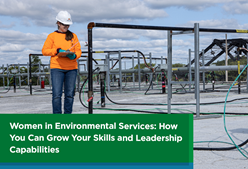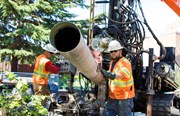Women in Environmental Services: Career Advice & Habits for Success
Environmental services is a rewarding industry in which to build a career—but it can also be daunting, especially if you’re one of the only women in your organization.
In this blog post, you’ll hear from women working as environmental consultants, chemists, engineers and project managers. They’re sharing the habits that have made them successful and the advice they’d give other women who are just starting out.
Habits for Success in Environmental Services
Like most careers, it helps to be organized and have passion for what you do, but my best advice to someone just coming into this field is to be a sponge: learn as much as you can, ask for a chance to help out with that cool project, and take on every opportunity thrown your way. You don’t have to be perfect, but as long as you’re motivated and keep trying, you’ll find your niche.
– Katelynn Shields, Project Scientist
Keeping an open mind and healthy curiosity are two good traits that have served me in this industry, but also in life.
– Alyson Fortune, Senior Scientist
I tend to be very organized and detail oriented. Action items lists have been a big tool for me to keep track of my project activities, responsibilities, due dates, etc.
– Nikole Huard, Senior Project Engineer
I ask a lot of questions and always want to know how things work. I believe my persistence and drive to always do better are the keys to my success.
– Patty Anaya, Project Manager
I believe I’ve been successful thanks to my attention to detail, persistence, and the drive to make the company better as a client’s first choice and as a great place to work for employees.
– Marti Anderson, Project Manager Associate
Career Advice for Women in Environmental Services
It’s hard sometimes to be the young girl on site trying to lead a field team or direct subcontractors who have been doing this job for 20 years. I’ve always felt that women often feel like they need to prove themselves or worry about speaking up and being wrong. This was definitely the case for me when I was first starting. Early on in my career, one of my many excellent mentors told me to “show up like you’ve been doing this for years, be confident, and walk away to call me if you need help.” That doesn’t sound like groundbreaking advice, but it reinforced an idea that I think all women joining male-dominated fields should know: you deserve to be here.
With time, you will develop more confidence and thicker skin, but until then, I reiterate: you deserve to be here. Even still, when you are unsure or need advice, it’s okay to step away, call the project manager, and just be honest that you need a little help.
– Katelynn Shields
Check out local networking groups related to environmental services or engineering. I can’t stress that enough, especially early on in your career or as you are trying to break into this field. Identify someone that you see as being where you want to be, then reach out to them to ask for their help or advice on how to get where they are.
– Alyson Fortune
There are so many different career paths that you can follow in this industry and there are companies that will support your professional growth. You will have opportunities to travel, conduct field work, develop professional relationships with some industry experts, and it is certainly never boring! Networking is so important. Get involved with organizations like Society of Women Engineers, or Engineers Without Borders. When you get involved and can meet people, you get a lot more insight about what kinds of jobs and career paths are out there, you create professional connections with people that can open doors for you later.
– Nikole Huard
My advice is to take the opportunities that come your way, work hard, and never give up! Cascade hosted a webinar awhile back where women in our industry discussed the challenges they’ve faced in environmental services and how they overcame them. The recording is available to watch on demand, and is a great opportunity to see how others have handled their careers. You can watch it here.
– Patty Anaya
Definitely take a chance, even if you’ve never had experience.
– Marti Anderson
I would search online to gather information about different career opportunities, what the job requirements are for different positions, and the kind of problems you’d be involved with solving. If you’re more of a visual learner, YouTube has videos that can help you understand many of the different drilling and remediation technologies. The best source, though, would be speaking directly with someone who is currently in the industry.
– Crystal Buchanan, Project Manager
Whether you’re new to environmental services or have been around for awhile, the work is always better when you have support. If you’re interested in our Women in Environmental Services group on LinkedIn, request to join here.





